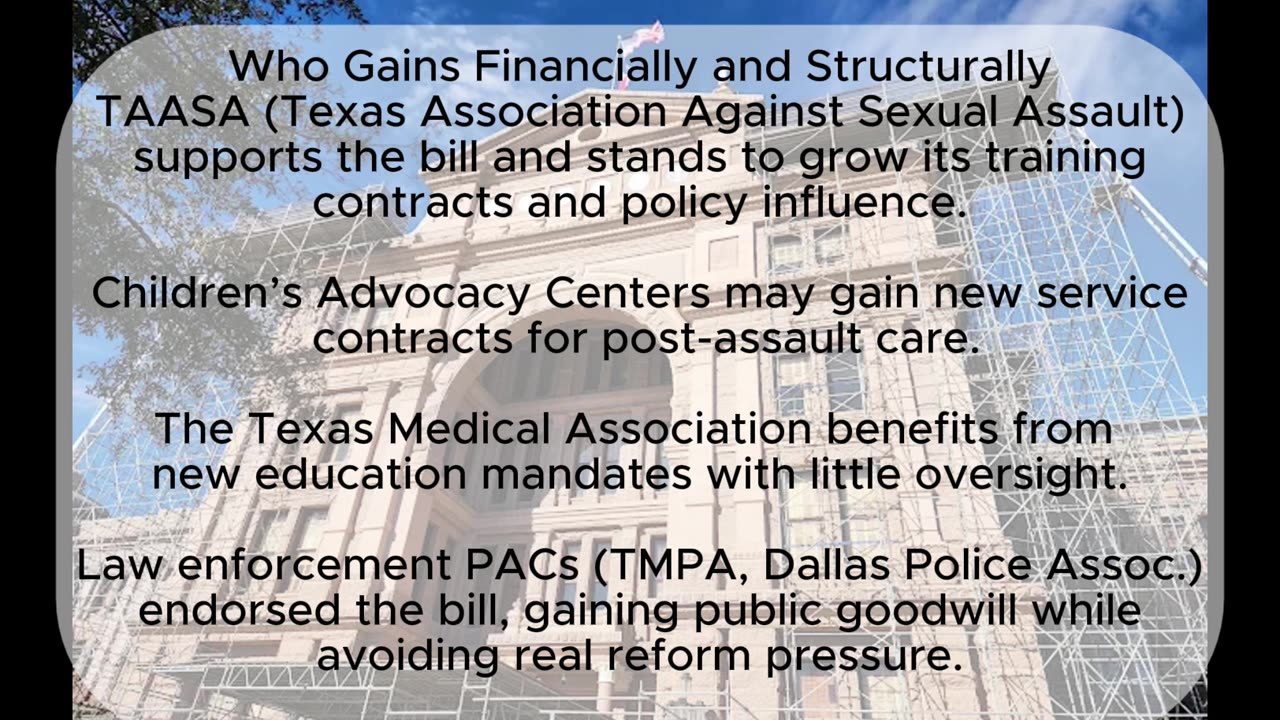Premium Only Content

"🟡 HB 47 – Strengthens Survivor Rights, But Leaves Gaps in Funding and Oversight
Authored by Rep. Donna Howard (D-HD48)
Topic: Sexual Assault Survivor Protections / Criminal Justice Reform
WHAT HB 47 DOES:
This bill expands legal protections, services, and notifications for survivors of sexual assault and related sex offenses in Texas. It broadens who qualifies as a victim, strengthens medical and legal rights after an assault, and adds new employment restrictions for registered sex offenders.
KEY CHANGES:
✔️ Victim definition expanded to include family violence and youth under 17
✔️ Law enforcement and prosecutors must keep victims updated on court dates, parole hearings, and DNA test results
✔️ Medical providers can now be reimbursed for up to 30 days of post-assault care
✔️ Hospitals must train intake staff on sexual assault response
✔️ New rules limit where registered sex offenders can work (e.g., rideshare, in-home services, public transportation)
✔️ Survivors must consent before defense attorneys make contact in capital cases
✔️ Sexual assault nurse examiner certifications extended from 2 to 3 years
WHO BENEFITS:
🟨 Survivors of sexual assault
🟨 Medical providers (reimbursement opportunities)
🟨 Victim advocacy nonprofits and legal aid centers
🟨 Licensing boards and training vendors who create new educational content
BUT HERE’S THE PROBLEM:
🔸 No new funding was attached.
Hospitals are required to offer care and training—but rural and underfunded facilities may not be able to comply. The bill promises reimbursement, but it depends on the Attorney General’s Office—and there’s no timeline or guarantee.
🔸 Oversight is thin.
The reporting system flows through the Governor’s Sexual Assault Survivors’ Task Force, which is exempt from most public information laws. There's no clear path for Texans to see how data is used or which counties are actually complying.
🔸 Training requirements lack quality control.
Hospitals only need to provide one hour of training to meet the mandate. There’s no audit process to ensure it’s meaningful, and no required updates as practices evolve.
🔸 Silent centralization.
Although the bill expands local response duties, it quietly consolidates control over standards, reimbursements, and data inside executive agencies—with limited public transparency.
BOTTOM LINE:
HB 47 is a well-intentioned step forward for survivors—but without funding, oversight, or public accountability, the people who need this protection most may still fall through the cracks.
WHAT WE NEED NEXT:
💡 Dedicated funding for post-assault care
💡 Time limits and reporting rules for reimbursement decisions
💡 Public transparency for the Task Force and county reports
💡 Quality audits for hospital staff training
Let’s build on the promise of HB 47—without leaving rural Texans or survivors behind.
Follow for more breakdowns of what Texas laws really do behind the headlines."
-
 1:12:08
1:12:08
TheCrucible
2 hours agoThe Extravaganza! EP: 39 (9/18/25)
68.8K8 -
 DVR
DVR
Kim Iversen
3 hours agoNick Fuentes Denies Israel Killed Charlie Kirk | Right-Wing CANCELS Jimmy Kimmel
15.6K88 -
 LIVE
LIVE
Candace Show Podcast
1 hour agoEXCLUSIVE! Another Photo Of Tyler Robinson | Candace Ep 238
9,679 watching -
 2:21:09
2:21:09
Redacted News
3 hours agoWhat are they hiding? New video evidence in Charlie Kirk's Shooting SHAKES FBI'S case | Redacted
126K198 -
 41:53
41:53
Kimberly Guilfoyle
5 hours agoCharlie's Legacy and Our Mission
28.4K6 -
 1:07:55
1:07:55
vivafrei
4 hours agoJimmy Kimmel Out Indefinitely! Trump "Srubs" Study on Right Wing Violence? Clinton Tweet & MORE
192K65 -
 1:35:02
1:35:02
The Quartering
4 hours agoNuclear Fallout From Jimmy Kimmel Firing, New Head Of TP USA, Obama Whines
213K74 -
 23:35
23:35
Jasmin Laine
3 hours ago“We Were Betrayed”—Carney HUMILIATED As His Base REVOLTS Against Him
28.1K13 -
 LIVE
LIVE
LFA TV
20 hours agoKIMMEL GONE | ANTIFA LABELED TERRORISTS! - THURSDAY 9/18/25
973 watching -
 LIVE
LIVE
freecastle
6 hours agoTAKE UP YOUR CROSS- Hope In GOD, and Fear NO Evil!
55 watching